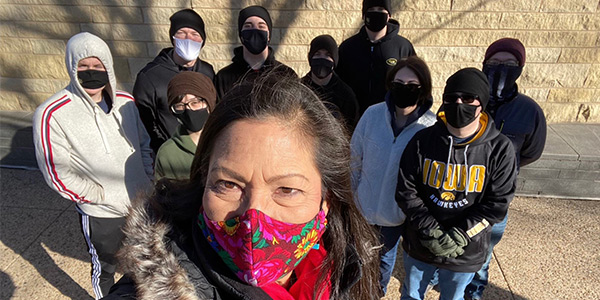Fossil energy will continue to play a major role in the U.S. for years to come, President Biden’s nominee for secretary of the interior, Rep. Deb Haaland (D-N.M.), told the Senate Energy and Natural Resources Committee on Tuesday.
Haaland said that she recognizes not only the importance of oil and gas reserves to local economies, but also the need to address climate change. She committed to working cooperatively with Congress and stakeholders to strike “the right balance” between those issues.
Several Republican committee members expressed concern that statements Haaland made in the past against fracking and pipelines and in favor of clean energy are demonstrative of how she would lead the Department of the Interior.
Haaland claimed to be “the highest-rated freshman in Congress on bipartisan collaboration” as evidence of her willingness to work across the aisle on the difficult issues their constituents face in the energy transition. When pressed whether she personally supports a ban on oil and gas, Haaland said that she would support the president’s agenda, not her own, in the role as secretary.
“I realize that serving as a cabinet secretary is far different from being a member of Congress, where I’m representing one district,” she said. “It’s representing every single American, and I recognize that there is a difference in those two roles.”
The ENR Committee adjourned Tuesday and scheduled a second session for the hearing at 10 a.m. on Wednesday.
Making History
Haaland said the significance of being the first Native American nominated for interior secretary was not lost on her.
Several committee members also acknowledged the milestone.
“I recognize, as a member of [the Senate Committee on] Indian Affairs, the historic nature of your nomination as the first Native American woman nominated by the president to lead the Department of Interior,” Sen. Catherine Cortez Masto (D-Nev.) said.
Sen. Mazie Hirono (D-Hawaii) noted how important it is that Haaland is a 35th generation Pueblo, which means, she said, “that your people were in our country long before the rest of us ever came here.”
Sen. John Hoeven (R-N.D.) took the opportunity to test Haaland’s commitment to Native American tribal interests as they relate to the fossil fuel industry.
Hoeven said Haaland protested Energy Transfer Partners’ Dakota Access oil pipeline and asked if she was still opposed to it. The pipeline was placed into service despite high-profile protests that started five years ago.
“Yes, I did go to stand with the water protectors during that [protest],” Haaland said. “The reason I did that is because I agreed with the tribe that they felt they weren’t consulted in the best way.”
Members of the Standing Rock Sioux Tribe said that siting of the pipeline under a lake near their reservation threatened water quality.
Hoeven pressed Haaland on her current position on the status of the pipeline, which is under environmental review again following a ruling last March by the D.C. District Court.
“Whenever these projects come up, we absolutely should make sure that we are consulting with tribes if, in fact, these projects do affect their lands and their sacred sites,” she said.
Hoeven asked Haaland if she would recuse herself from matters related to the pipeline that come before the department to avoid a conflict of interest. Haaland answered that she would heed the advice of department attorneys on any potential conflicts.







